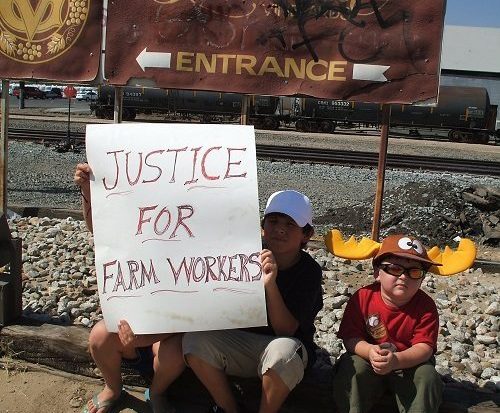
By Eduardo Stanley
California made history again September 12, 2016, when governor Jerry Brown signed a bill entitling farmworkers to receive overtime pay, like the state’s other workers, after eight hours of work in a day or 40 in a week. Bill AB 1066 was introduced by Assemblywoman Lorena Sanchez (D-San Diego) and will be phased in starting in 2019. It will take full effect in 2022 for most businesses and in 2025 for farms with 25 or fewer farmworkers.
This is plenty of time for growers and agricultural corporations to mechanize their operations and to learn new tricks to reduce working hours to avoid paying such overtime. Yet, the cry of growers is loud and they are voicing their intentions to avoid employing farmworkers for more than 40 hours per week. Their patronizing and paternalistic message regarding what they consider negative effects of the new law exposes their anger and arrogance. They claim farmworkers will get smaller paychecks and they also repeat the argument that fresh products will cost more.
They almost predict an agricultural catastrophe while trying to instill fear. We heard similar arguments recently when California approved an increase in the minimum wage —up to $15 by 2022. The new law ends a 78-year exclusion of farmworkers for receiving overtime pay as established by the Fair Labor Standards Act of 1938, which as a matter of fact perpetuated an agricultural subsidy at the expense of farmworkers, keeping them at the lowest level of the social strata.
California is the largest agricultural state in the country, yet the social inequality and poverty of farmworkers are rampant. Annually, the average income of crop workers is between $10,000 to $12,499 for individuals and $15,000 to $17,499 for a family, according to the National Agricultural Workers Survey (NAWS), a report published by the US Department of Labor. The federal poverty line is $10,830 for an individual or $22,050 for a family of four (in 2009).
Thus, according to NAWS, 30% of all farmworkers had total family incomes below the poverty line. Nothing new. The poverty level in California is still high. A new Supplemental Poverty Measure (http://www.census.gov/content/dam/Census/library/publications/2016/demo/p60-258.pdf) by the US Census Bureau, covering the 2013-2015 period, found that nearly 8 million Californians, 20.6 percent of the state’s residents, are living in poverty.
Still, conservative public officers representing agricultural areas such as the San Joaquin Valley, constantly insist on covering up this reality and justifying the huge social and economic gap. For instance, Assemblyman Jim Patterson (R-Fresno), constantly opposes any bill or effort to increase salaries and/or benefits for workers of all kinds with the excuse that businesses will suffer —particularly small ones— putting them out of business or being forced to reduce their workforce. Thus, according to this conservative-repeated argument, nothing should be done or changed and workers should stay put without complaining or unionizing.
As a complementary component, conservatives work hard to keep an awkward cultural environment for less fortunate people while they and their children have access to better education and social opportunities. Let us keep in mind that while they complain about the minimum wage increase or the new overtime law, some growers open their wallets generously to donate money to Donald Trump’s campaign, who during a one-hour visit to Visalia, collected $1.5 million dollars on August 30.
Most likely, California’s new law will affect neither the agricultural industry nor the farmworkers’ income dramatically. However, this will not stop growers and their allies like Patterson, from crying and predicting catastrophic events each time California has a new law seeking a modest improvement of workers’ life. By the way, while growers need farmworkers, does agriculture need growers? For instance, if growers are replaced by co-ops or other land-property or land management systems, perhaps society in rural areas could experiment with a social and cultural improvement which could lead to a better lifestyle that is fairer and more just.
*****
After graduating from film school at the University of La Plata, Argentina, Eduardo Stanley received a scholarship for postgraduate studies in semiotics at the University of Bucharest, Romania. Then he moved to Mexico, where he taught at the University of Sinaloa. Stanley later moved to California, developing a career as a journalist and photographer—writing mainly in Spanish. Stanley also has covered stories in Argentina, Colombia, Spain, and Mexico. He currently freelances for several Latino media outlets and hosts a radio show in Spanish on KFCF-FM 88.1 in Fresno.
